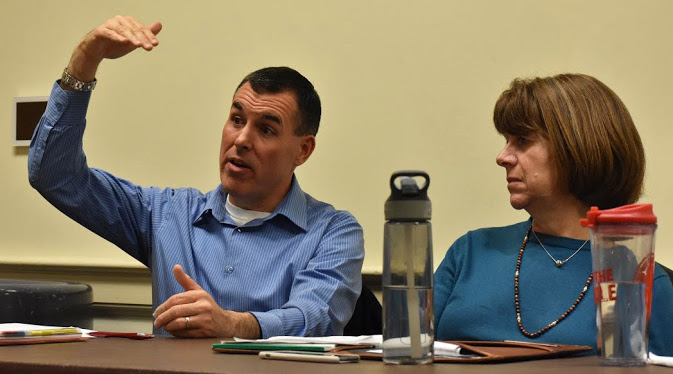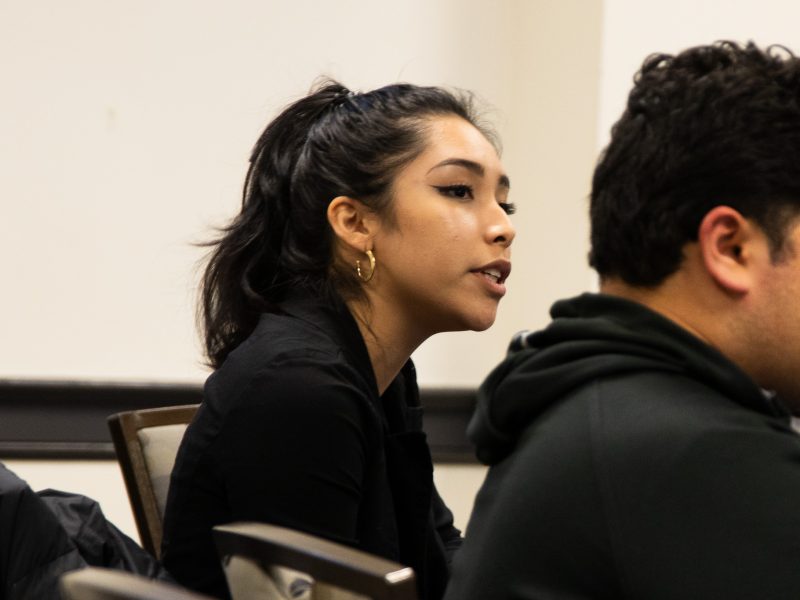University of Maryland students voiced concerns about inclusion on campus at a town hall with dining, transportation, Resident Life and Resident Facilities officials Tuesday evening.
The RHA holds a town hall once a semester to allow students to talk to and receive updates from officials from various university departments. The town hall aims to provide a “direct line” from students to department officials so they can be engaged and provide input on campus issues, said Sasha Galbreath, RHA vice president and a senior government and politics major.
“An overarching political theme that we’ve been seeing, both on and off campus, is a sense of inaccessibility to the people who really make the decisions,” Galbreath said. “This is our way of paving that road to civic engagement as well as accessibility to the directors.”
Lexi Duncan, a sophomore psychology major and an RHA senator-at-large, asked if Dining Services had considered replacing the stairs to the bathroom in the South Campus Dining Hall with a wheelchair ramp. Currently, students with wheelchairs would have to use the elevator and go to the third floor to use the restroom, Duncan noted.
Colleen Wright-Riva, Dining Services director, said she is aware of the issue and the department is pursuing plans to build a lift to access the bathroom.
“We actually had a proposal to correct that,” she said. “We can’t use a ramp. Because [of] the way it lays out, we don’t have enough space to do that.”
Dining Services was planning to build the lift this summer, but this will likely have to be postponed, Wright-Riva said. An initial quote to improve the bathrooms in accordance with American Disabililities Act guidelines and build the lift was a “couple hundred thousand dollars,” Wright-Riva said, but the project was later estimated to cost half a million dollars.
The hike in costs came from issues regarding construction management, dumpsters, permits and design which brought prices up, Joe Mullineaux, Dining Services senior associate director, said in a phone call after the town hall.
Dana Rodriguez, RHA Student Groups and Organizations liaison, said she wanted to know how Resident Life accommodates LGBTQIA+ students in the housing process. While Resident Life offers mixed-gender and gender-inclusive housing, Rodriguez, a junior finance and government and politics major, asked what options were available for students who may identify as a gender different from their biological sex.
“We want to make sure that [we] provide safe and comfortable housing options,” said Dennis Passarella-George, Resident Life South Campus associate director. “Room selection is coming and you can choose who you want to live with … we know that certainly our processes won’t fit for every single person, so we would we want to know [about those situations].”
With the Anytime Dining plan, the hours for the vegan stations in the dining halls are only from 11 a.m. to 8 p.m., said Maille O’Donnell, a sophomore environmental science and policy major. This leaves vegans with few dining options outside this time range, she said.
“Our commitment to vegan menuing was to make sure it was available in all three dining halls this year, and I think we’ve worked hard to do that,” Wright-Riva said. “Unfortunately, what has happened is we haven’t gotten a lot of traction … it’s hard to keep it open for the entire span of hours if we don’t get traffic.”
Dining Services can speak with the department’s culinary team to see if there is a way students could have access to vegan options after the stations close, Wright-Riva said.



